BUS4007: Analyzing Business Environment and Stakeholder Interests
VerifiedAdded on 2022/11/29
|11
|3411
|452
Report
AI Summary
This report provides a comprehensive analysis of the business environment, exploring various organizational types such as public, private, voluntary, and charitable companies. It delves into stakeholder identification and management, examining the interests and influence of key internal and external stakeholders, specifically focusing on Marks and Spencer (M&S). The report utilizes Porter's Five Forces model to assess the competitive landscape of M&S and analyzes the role and effectiveness of the World Bank. The analysis includes strategies for managing stakeholder relationships, evaluating the impact of the business environment on selected organizations, and applying economic tools to determine appropriate business decisions. The assignment covers the legal structures of enterprises, their stakeholders and the competitive market environment both nationally and internationally, and provides a conclusion that draws on how effective the World Bank is at achieving its mission and vision.
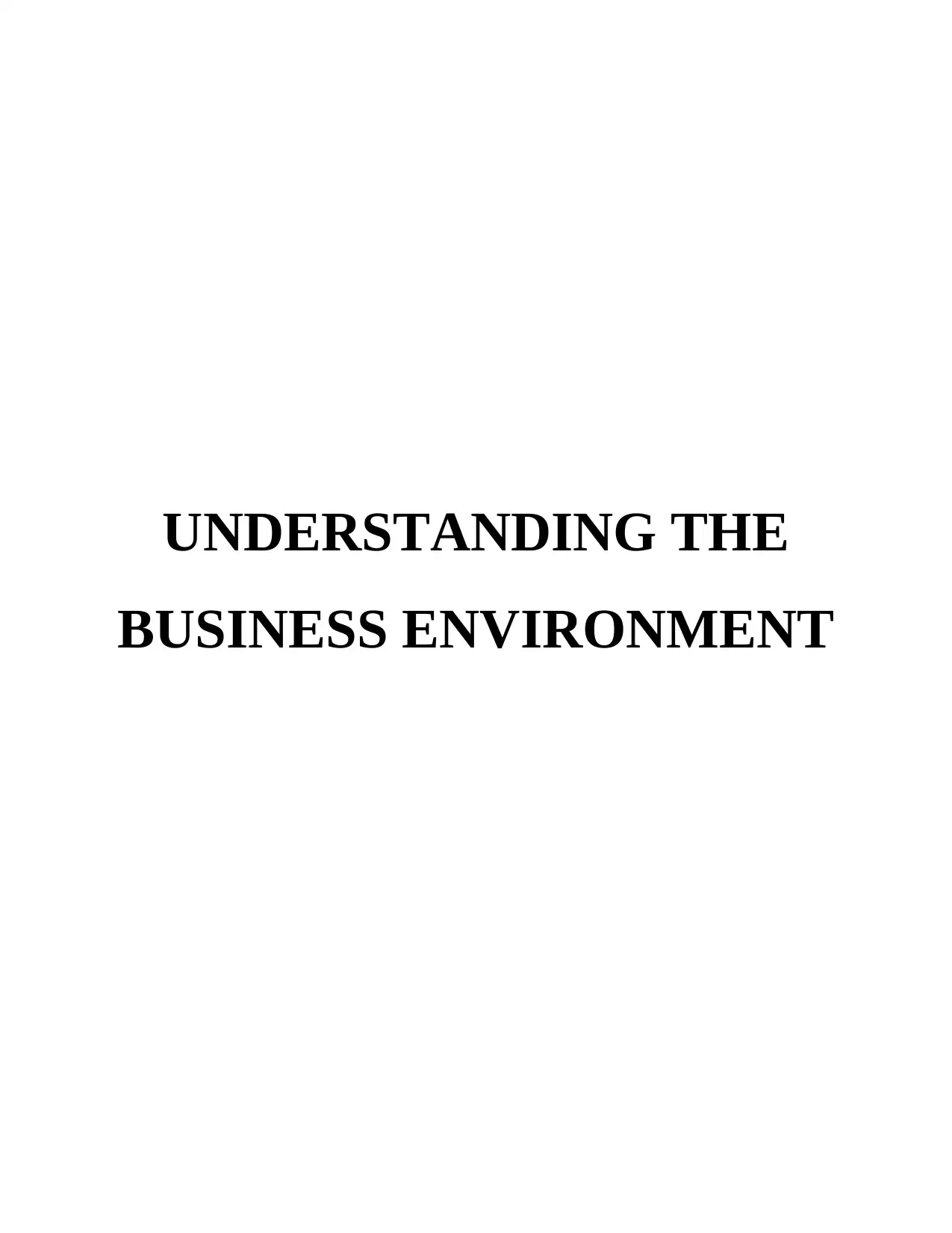
UNDERSTANDING THE
BUSINESS ENVIRONMENT
BUSINESS ENVIRONMENT
Paraphrase This Document
Need a fresh take? Get an instant paraphrase of this document with our AI Paraphraser
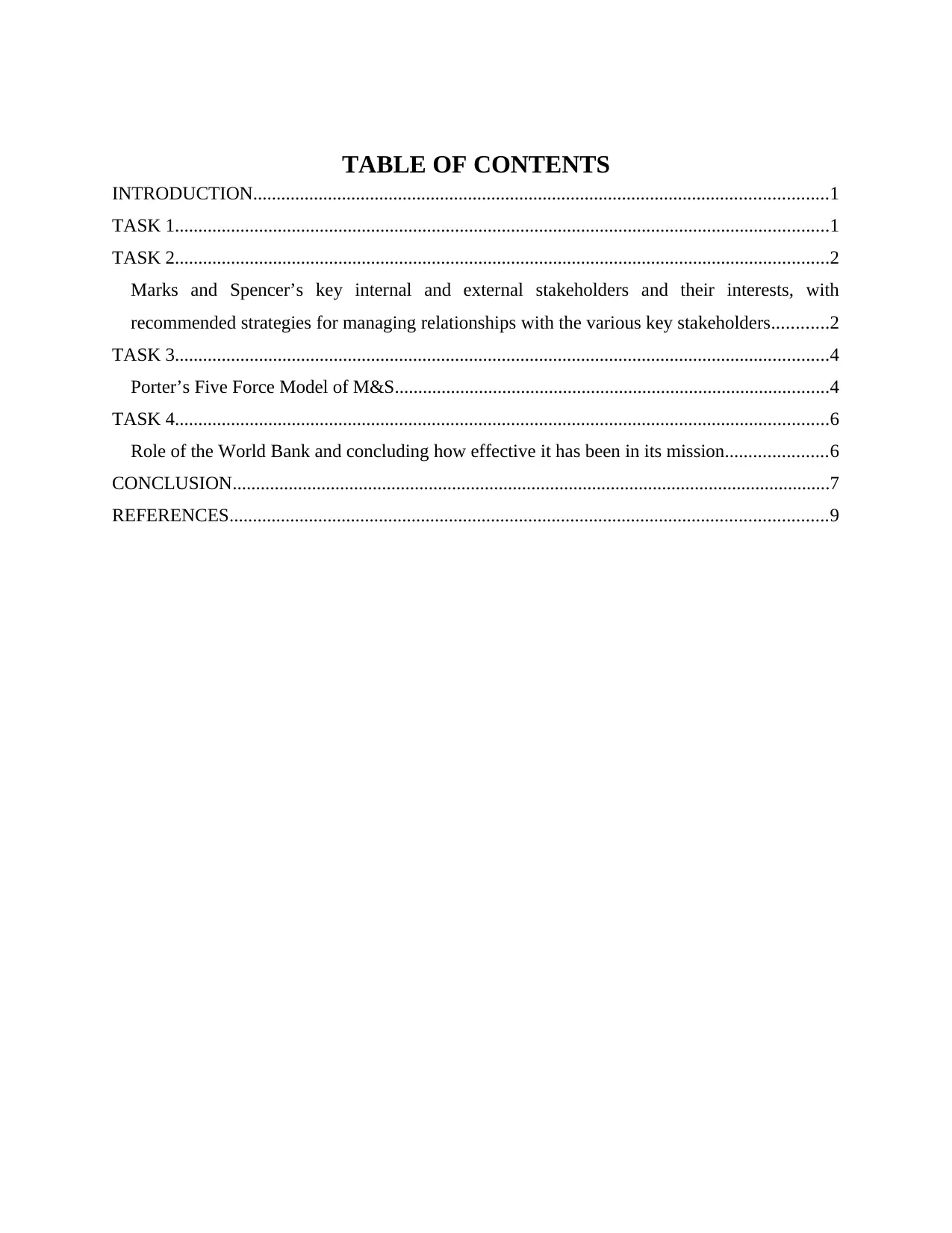
TABLE OF CONTENTS
INTRODUCTION...........................................................................................................................1
TASK 1............................................................................................................................................1
TASK 2............................................................................................................................................2
Marks and Spencer’s key internal and external stakeholders and their interests, with
recommended strategies for managing relationships with the various key stakeholders............2
TASK 3............................................................................................................................................4
Porter’s Five Force Model of M&S.............................................................................................4
TASK 4............................................................................................................................................6
Role of the World Bank and concluding how effective it has been in its mission......................6
CONCLUSION................................................................................................................................7
REFERENCES................................................................................................................................9
INTRODUCTION...........................................................................................................................1
TASK 1............................................................................................................................................1
TASK 2............................................................................................................................................2
Marks and Spencer’s key internal and external stakeholders and their interests, with
recommended strategies for managing relationships with the various key stakeholders............2
TASK 3............................................................................................................................................4
Porter’s Five Force Model of M&S.............................................................................................4
TASK 4............................................................................................................................................6
Role of the World Bank and concluding how effective it has been in its mission......................6
CONCLUSION................................................................................................................................7
REFERENCES................................................................................................................................9
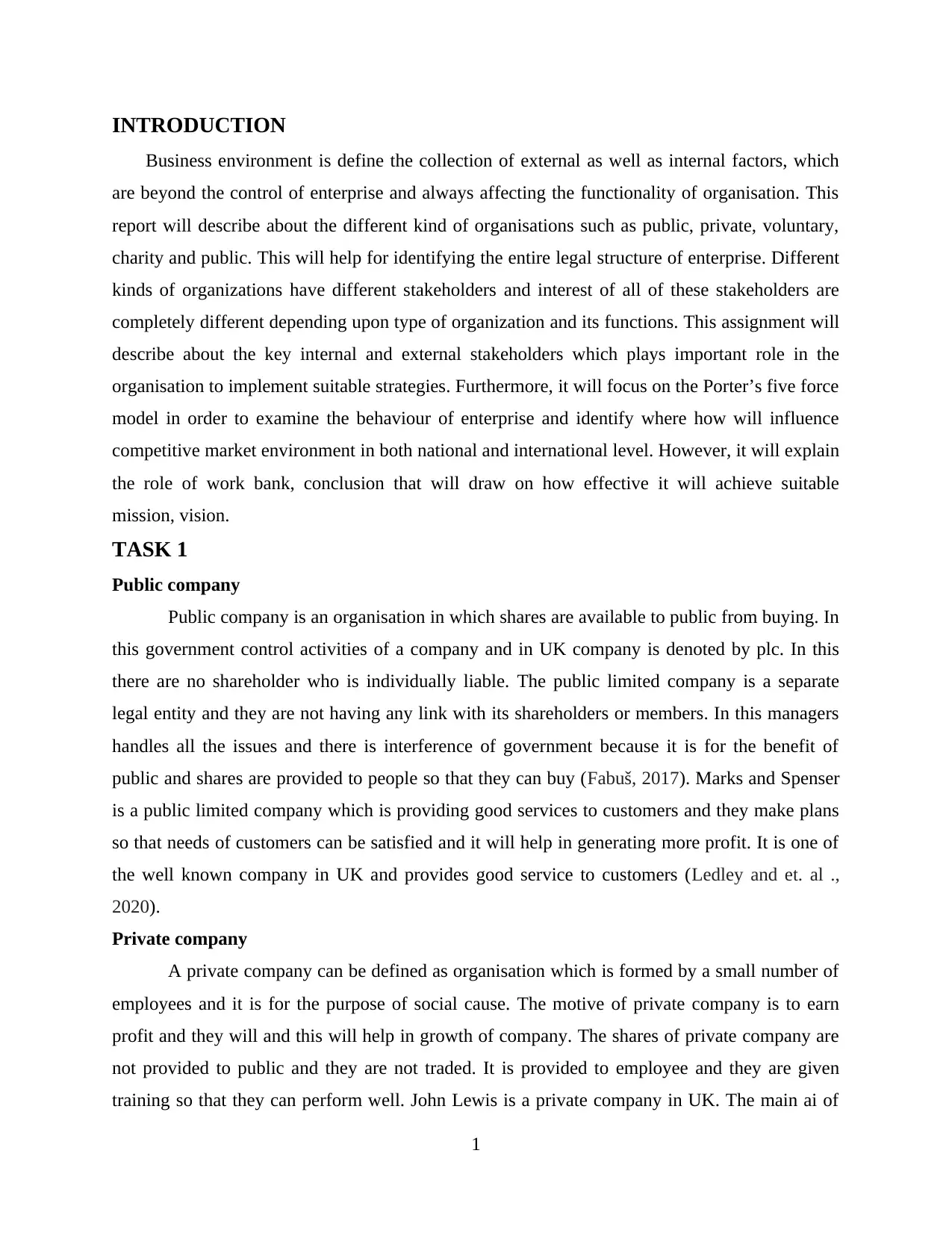
INTRODUCTION
Business environment is define the collection of external as well as internal factors, which
are beyond the control of enterprise and always affecting the functionality of organisation. This
report will describe about the different kind of organisations such as public, private, voluntary,
charity and public. This will help for identifying the entire legal structure of enterprise. Different
kinds of organizations have different stakeholders and interest of all of these stakeholders are
completely different depending upon type of organization and its functions. This assignment will
describe about the key internal and external stakeholders which plays important role in the
organisation to implement suitable strategies. Furthermore, it will focus on the Porter’s five force
model in order to examine the behaviour of enterprise and identify where how will influence
competitive market environment in both national and international level. However, it will explain
the role of work bank, conclusion that will draw on how effective it will achieve suitable
mission, vision.
TASK 1
Public company
Public company is an organisation in which shares are available to public from buying. In
this government control activities of a company and in UK company is denoted by plc. In this
there are no shareholder who is individually liable. The public limited company is a separate
legal entity and they are not having any link with its shareholders or members. In this managers
handles all the issues and there is interference of government because it is for the benefit of
public and shares are provided to people so that they can buy (Fabuš, 2017). Marks and Spenser
is a public limited company which is providing good services to customers and they make plans
so that needs of customers can be satisfied and it will help in generating more profit. It is one of
the well known company in UK and provides good service to customers (Ledley and et. al .,
2020).
Private company
A private company can be defined as organisation which is formed by a small number of
employees and it is for the purpose of social cause. The motive of private company is to earn
profit and they will and this will help in growth of company. The shares of private company are
not provided to public and they are not traded. It is provided to employee and they are given
training so that they can perform well. John Lewis is a private company in UK. The main ai of
1
Business environment is define the collection of external as well as internal factors, which
are beyond the control of enterprise and always affecting the functionality of organisation. This
report will describe about the different kind of organisations such as public, private, voluntary,
charity and public. This will help for identifying the entire legal structure of enterprise. Different
kinds of organizations have different stakeholders and interest of all of these stakeholders are
completely different depending upon type of organization and its functions. This assignment will
describe about the key internal and external stakeholders which plays important role in the
organisation to implement suitable strategies. Furthermore, it will focus on the Porter’s five force
model in order to examine the behaviour of enterprise and identify where how will influence
competitive market environment in both national and international level. However, it will explain
the role of work bank, conclusion that will draw on how effective it will achieve suitable
mission, vision.
TASK 1
Public company
Public company is an organisation in which shares are available to public from buying. In
this government control activities of a company and in UK company is denoted by plc. In this
there are no shareholder who is individually liable. The public limited company is a separate
legal entity and they are not having any link with its shareholders or members. In this managers
handles all the issues and there is interference of government because it is for the benefit of
public and shares are provided to people so that they can buy (Fabuš, 2017). Marks and Spenser
is a public limited company which is providing good services to customers and they make plans
so that needs of customers can be satisfied and it will help in generating more profit. It is one of
the well known company in UK and provides good service to customers (Ledley and et. al .,
2020).
Private company
A private company can be defined as organisation which is formed by a small number of
employees and it is for the purpose of social cause. The motive of private company is to earn
profit and they will and this will help in growth of company. The shares of private company are
not provided to public and they are not traded. It is provided to employee and they are given
training so that they can perform well. John Lewis is a private company in UK. The main ai of
1
⊘ This is a preview!⊘
Do you want full access?
Subscribe today to unlock all pages.

Trusted by 1+ million students worldwide
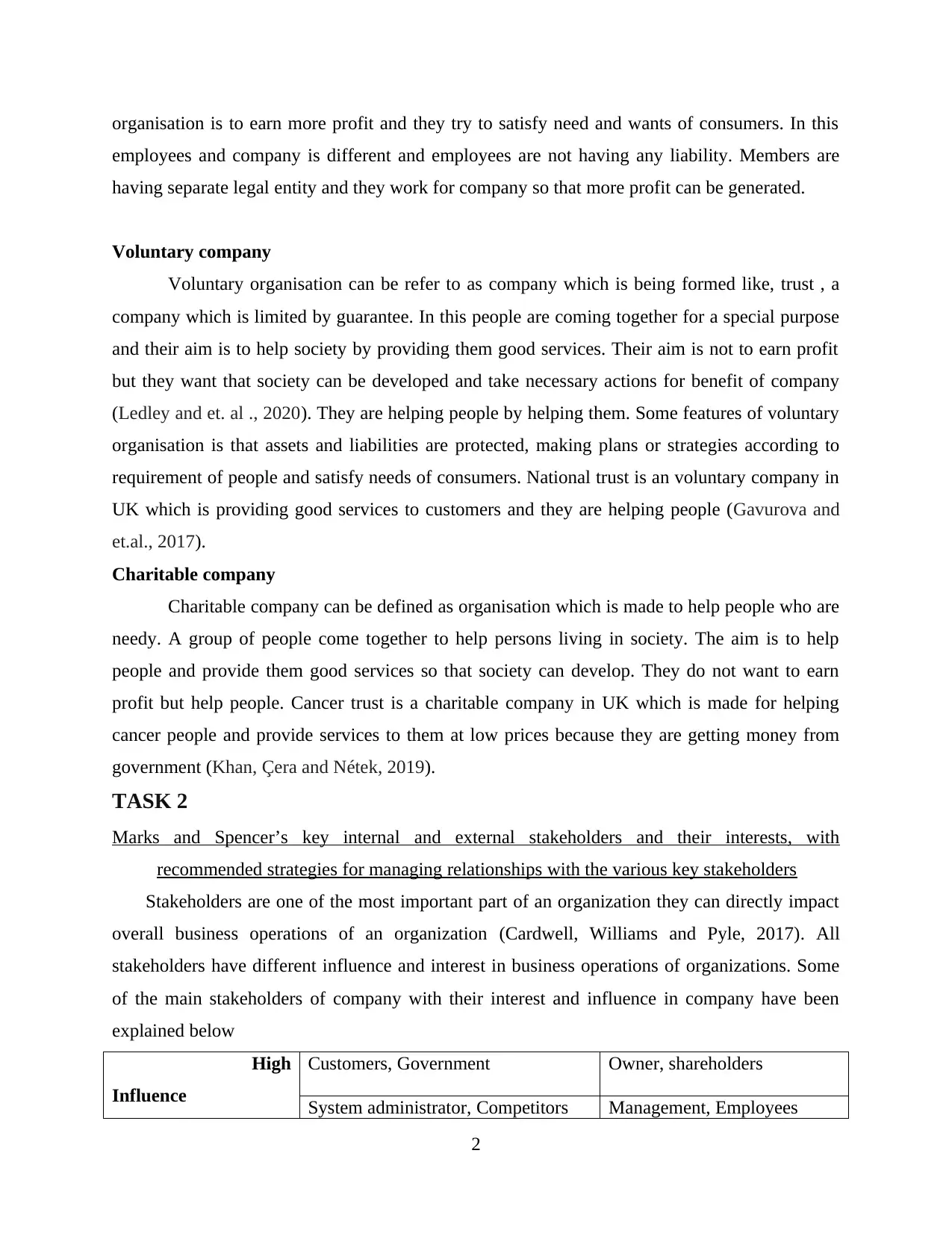
organisation is to earn more profit and they try to satisfy need and wants of consumers. In this
employees and company is different and employees are not having any liability. Members are
having separate legal entity and they work for company so that more profit can be generated.
Voluntary company
Voluntary organisation can be refer to as company which is being formed like, trust , a
company which is limited by guarantee. In this people are coming together for a special purpose
and their aim is to help society by providing them good services. Their aim is not to earn profit
but they want that society can be developed and take necessary actions for benefit of company
(Ledley and et. al ., 2020). They are helping people by helping them. Some features of voluntary
organisation is that assets and liabilities are protected, making plans or strategies according to
requirement of people and satisfy needs of consumers. National trust is an voluntary company in
UK which is providing good services to customers and they are helping people (Gavurova and
et.al., 2017).
Charitable company
Charitable company can be defined as organisation which is made to help people who are
needy. A group of people come together to help persons living in society. The aim is to help
people and provide them good services so that society can develop. They do not want to earn
profit but help people. Cancer trust is a charitable company in UK which is made for helping
cancer people and provide services to them at low prices because they are getting money from
government (Khan, Çera and Nétek, 2019).
TASK 2
Marks and Spencer’s key internal and external stakeholders and their interests, with
recommended strategies for managing relationships with the various key stakeholders
Stakeholders are one of the most important part of an organization they can directly impact
overall business operations of an organization (Cardwell, Williams and Pyle, 2017). All
stakeholders have different influence and interest in business operations of organizations. Some
of the main stakeholders of company with their interest and influence in company have been
explained below
High
Influence
Customers, Government Owner, shareholders
System administrator, Competitors Management, Employees
2
employees and company is different and employees are not having any liability. Members are
having separate legal entity and they work for company so that more profit can be generated.
Voluntary company
Voluntary organisation can be refer to as company which is being formed like, trust , a
company which is limited by guarantee. In this people are coming together for a special purpose
and their aim is to help society by providing them good services. Their aim is not to earn profit
but they want that society can be developed and take necessary actions for benefit of company
(Ledley and et. al ., 2020). They are helping people by helping them. Some features of voluntary
organisation is that assets and liabilities are protected, making plans or strategies according to
requirement of people and satisfy needs of consumers. National trust is an voluntary company in
UK which is providing good services to customers and they are helping people (Gavurova and
et.al., 2017).
Charitable company
Charitable company can be defined as organisation which is made to help people who are
needy. A group of people come together to help persons living in society. The aim is to help
people and provide them good services so that society can develop. They do not want to earn
profit but help people. Cancer trust is a charitable company in UK which is made for helping
cancer people and provide services to them at low prices because they are getting money from
government (Khan, Çera and Nétek, 2019).
TASK 2
Marks and Spencer’s key internal and external stakeholders and their interests, with
recommended strategies for managing relationships with the various key stakeholders
Stakeholders are one of the most important part of an organization they can directly impact
overall business operations of an organization (Cardwell, Williams and Pyle, 2017). All
stakeholders have different influence and interest in business operations of organizations. Some
of the main stakeholders of company with their interest and influence in company have been
explained below
High
Influence
Customers, Government Owner, shareholders
System administrator, Competitors Management, Employees
2
Paraphrase This Document
Need a fresh take? Get an instant paraphrase of this document with our AI Paraphraser
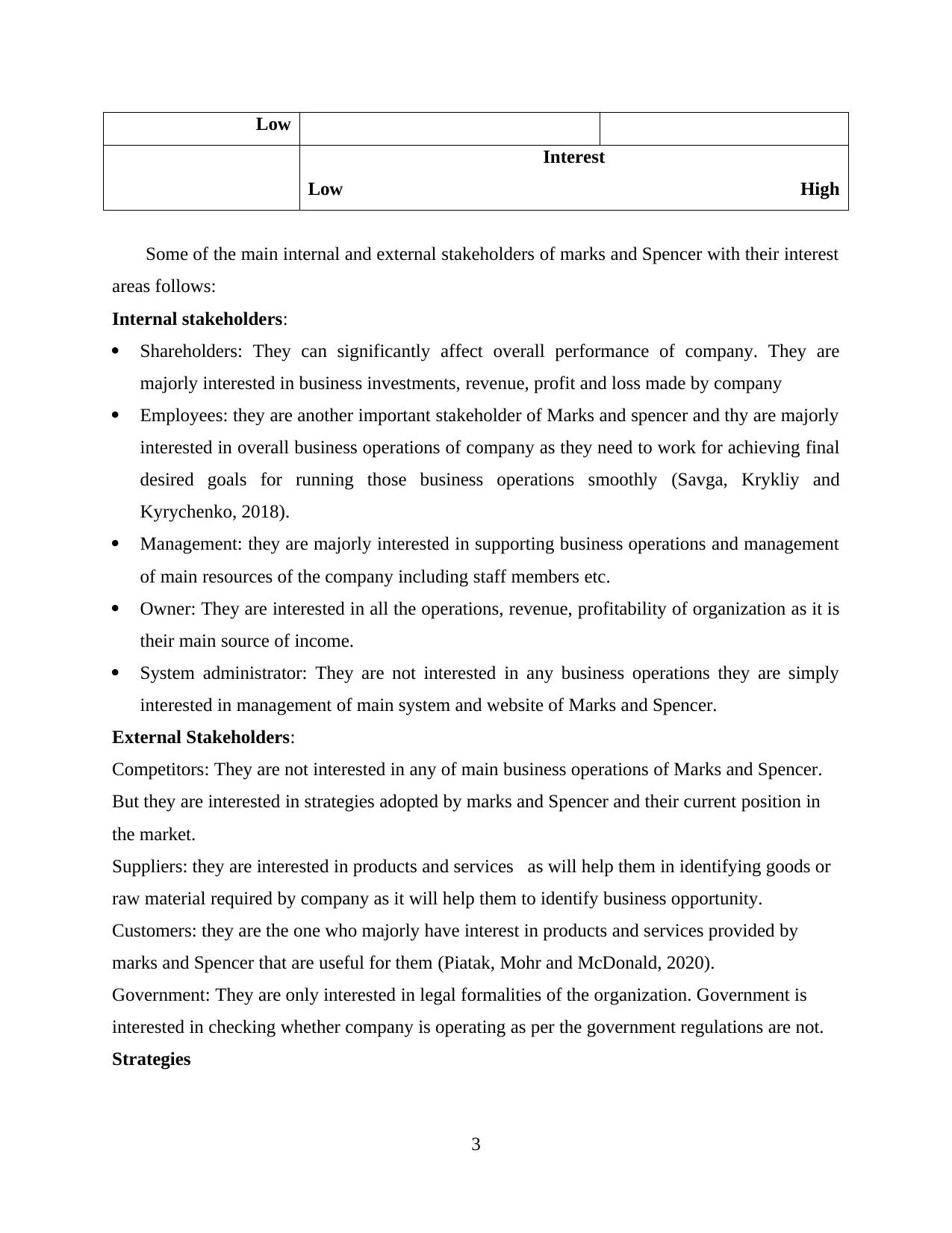
Low
Interest
Low High
Some of the main internal and external stakeholders of marks and Spencer with their interest
areas follows:
Internal stakeholders:
Shareholders: They can significantly affect overall performance of company. They are
majorly interested in business investments, revenue, profit and loss made by company
Employees: they are another important stakeholder of Marks and spencer and thy are majorly
interested in overall business operations of company as they need to work for achieving final
desired goals for running those business operations smoothly (Savga, Krykliy and
Kyrychenko, 2018).
Management: they are majorly interested in supporting business operations and management
of main resources of the company including staff members etc.
Owner: They are interested in all the operations, revenue, profitability of organization as it is
their main source of income.
System administrator: They are not interested in any business operations they are simply
interested in management of main system and website of Marks and Spencer.
External Stakeholders:
Competitors: They are not interested in any of main business operations of Marks and Spencer.
But they are interested in strategies adopted by marks and Spencer and their current position in
the market.
Suppliers: they are interested in products and services as will help them in identifying goods or
raw material required by company as it will help them to identify business opportunity.
Customers: they are the one who majorly have interest in products and services provided by
marks and Spencer that are useful for them (Piatak, Mohr and McDonald, 2020).
Government: They are only interested in legal formalities of the organization. Government is
interested in checking whether company is operating as per the government regulations are not.
Strategies
3
Interest
Low High
Some of the main internal and external stakeholders of marks and Spencer with their interest
areas follows:
Internal stakeholders:
Shareholders: They can significantly affect overall performance of company. They are
majorly interested in business investments, revenue, profit and loss made by company
Employees: they are another important stakeholder of Marks and spencer and thy are majorly
interested in overall business operations of company as they need to work for achieving final
desired goals for running those business operations smoothly (Savga, Krykliy and
Kyrychenko, 2018).
Management: they are majorly interested in supporting business operations and management
of main resources of the company including staff members etc.
Owner: They are interested in all the operations, revenue, profitability of organization as it is
their main source of income.
System administrator: They are not interested in any business operations they are simply
interested in management of main system and website of Marks and Spencer.
External Stakeholders:
Competitors: They are not interested in any of main business operations of Marks and Spencer.
But they are interested in strategies adopted by marks and Spencer and their current position in
the market.
Suppliers: they are interested in products and services as will help them in identifying goods or
raw material required by company as it will help them to identify business opportunity.
Customers: they are the one who majorly have interest in products and services provided by
marks and Spencer that are useful for them (Piatak, Mohr and McDonald, 2020).
Government: They are only interested in legal formalities of the organization. Government is
interested in checking whether company is operating as per the government regulations are not.
Strategies
3
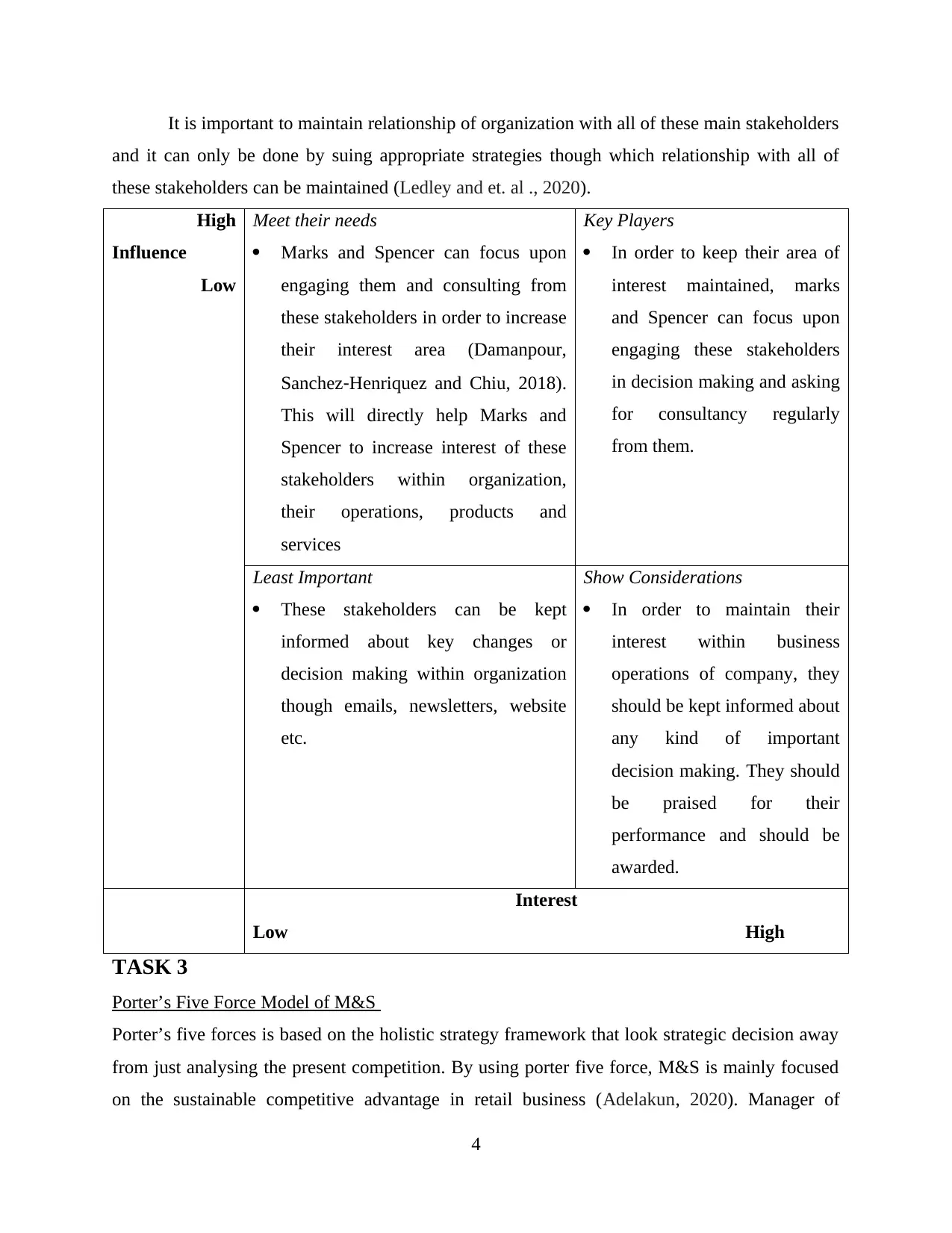
It is important to maintain relationship of organization with all of these main stakeholders
and it can only be done by suing appropriate strategies though which relationship with all of
these stakeholders can be maintained (Ledley and et. al ., 2020).
High
Influence
Low
Meet their needs
Marks and Spencer can focus upon
engaging them and consulting from
these stakeholders in order to increase
their interest area (Damanpour,
Sanchez‐Henriquez and Chiu, 2018).
This will directly help Marks and
Spencer to increase interest of these
stakeholders within organization,
their operations, products and
services
Key Players
In order to keep their area of
interest maintained, marks
and Spencer can focus upon
engaging these stakeholders
in decision making and asking
for consultancy regularly
from them.
Least Important
These stakeholders can be kept
informed about key changes or
decision making within organization
though emails, newsletters, website
etc.
Show Considerations
In order to maintain their
interest within business
operations of company, they
should be kept informed about
any kind of important
decision making. They should
be praised for their
performance and should be
awarded.
Interest
Low High
TASK 3
Porter’s Five Force Model of M&S
Porter’s five forces is based on the holistic strategy framework that look strategic decision away
from just analysing the present competition. By using porter five force, M&S is mainly focused
on the sustainable competitive advantage in retail business (Adelakun, 2020). Manager of
4
and it can only be done by suing appropriate strategies though which relationship with all of
these stakeholders can be maintained (Ledley and et. al ., 2020).
High
Influence
Low
Meet their needs
Marks and Spencer can focus upon
engaging them and consulting from
these stakeholders in order to increase
their interest area (Damanpour,
Sanchez‐Henriquez and Chiu, 2018).
This will directly help Marks and
Spencer to increase interest of these
stakeholders within organization,
their operations, products and
services
Key Players
In order to keep their area of
interest maintained, marks
and Spencer can focus upon
engaging these stakeholders
in decision making and asking
for consultancy regularly
from them.
Least Important
These stakeholders can be kept
informed about key changes or
decision making within organization
though emails, newsletters, website
etc.
Show Considerations
In order to maintain their
interest within business
operations of company, they
should be kept informed about
any kind of important
decision making. They should
be praised for their
performance and should be
awarded.
Interest
Low High
TASK 3
Porter’s Five Force Model of M&S
Porter’s five forces is based on the holistic strategy framework that look strategic decision away
from just analysing the present competition. By using porter five force, M&S is mainly focused
on the sustainable competitive advantage in retail business (Adelakun, 2020). Manager of
4
⊘ This is a preview!⊘
Do you want full access?
Subscribe today to unlock all pages.

Trusted by 1+ million students worldwide
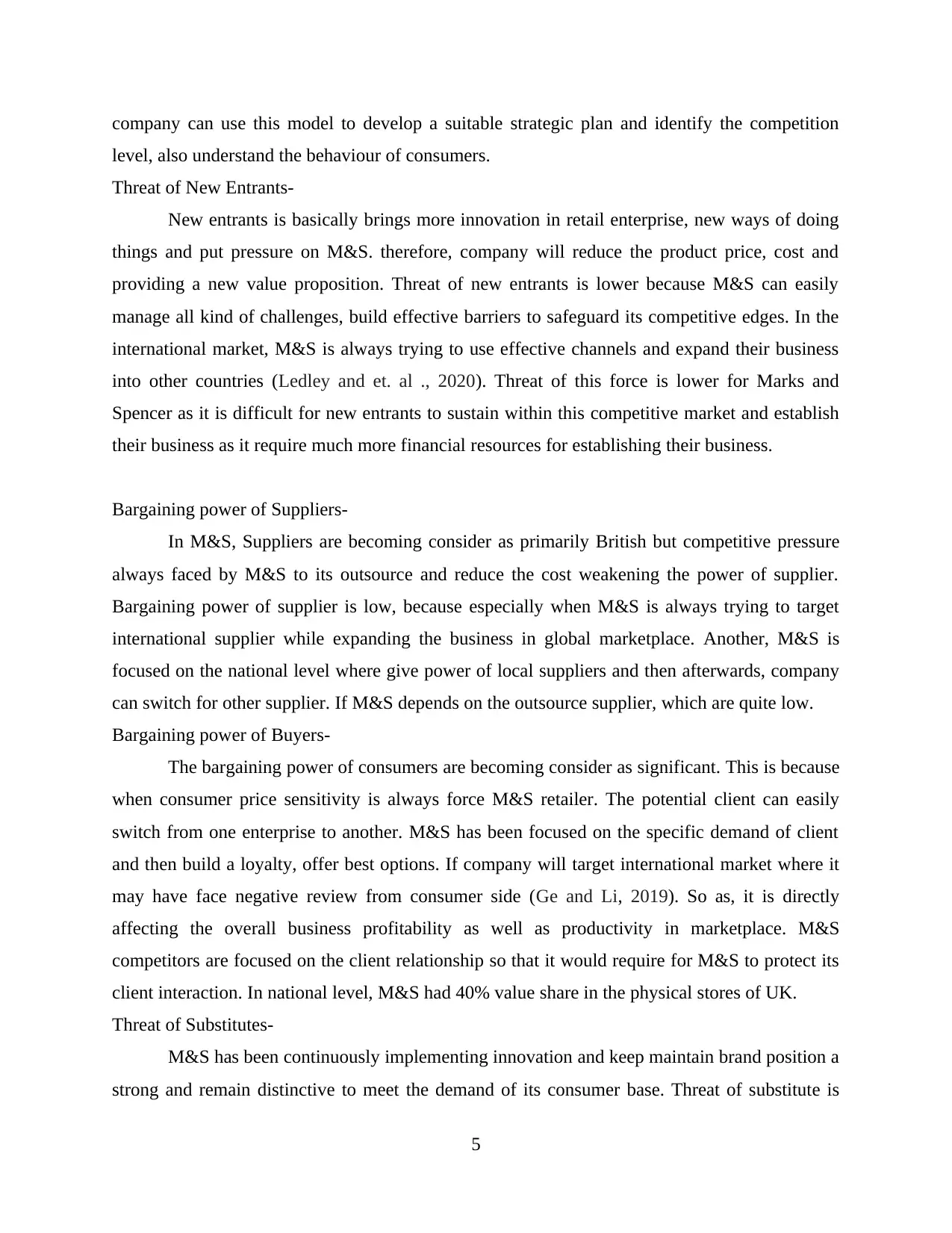
company can use this model to develop a suitable strategic plan and identify the competition
level, also understand the behaviour of consumers.
Threat of New Entrants-
New entrants is basically brings more innovation in retail enterprise, new ways of doing
things and put pressure on M&S. therefore, company will reduce the product price, cost and
providing a new value proposition. Threat of new entrants is lower because M&S can easily
manage all kind of challenges, build effective barriers to safeguard its competitive edges. In the
international market, M&S is always trying to use effective channels and expand their business
into other countries (Ledley and et. al ., 2020). Threat of this force is lower for Marks and
Spencer as it is difficult for new entrants to sustain within this competitive market and establish
their business as it require much more financial resources for establishing their business.
Bargaining power of Suppliers-
In M&S, Suppliers are becoming consider as primarily British but competitive pressure
always faced by M&S to its outsource and reduce the cost weakening the power of supplier.
Bargaining power of supplier is low, because especially when M&S is always trying to target
international supplier while expanding the business in global marketplace. Another, M&S is
focused on the national level where give power of local suppliers and then afterwards, company
can switch for other supplier. If M&S depends on the outsource supplier, which are quite low.
Bargaining power of Buyers-
The bargaining power of consumers are becoming consider as significant. This is because
when consumer price sensitivity is always force M&S retailer. The potential client can easily
switch from one enterprise to another. M&S has been focused on the specific demand of client
and then build a loyalty, offer best options. If company will target international market where it
may have face negative review from consumer side (Ge and Li, 2019). So as, it is directly
affecting the overall business profitability as well as productivity in marketplace. M&S
competitors are focused on the client relationship so that it would require for M&S to protect its
client interaction. In national level, M&S had 40% value share in the physical stores of UK.
Threat of Substitutes-
M&S has been continuously implementing innovation and keep maintain brand position a
strong and remain distinctive to meet the demand of its consumer base. Threat of substitute is
5
level, also understand the behaviour of consumers.
Threat of New Entrants-
New entrants is basically brings more innovation in retail enterprise, new ways of doing
things and put pressure on M&S. therefore, company will reduce the product price, cost and
providing a new value proposition. Threat of new entrants is lower because M&S can easily
manage all kind of challenges, build effective barriers to safeguard its competitive edges. In the
international market, M&S is always trying to use effective channels and expand their business
into other countries (Ledley and et. al ., 2020). Threat of this force is lower for Marks and
Spencer as it is difficult for new entrants to sustain within this competitive market and establish
their business as it require much more financial resources for establishing their business.
Bargaining power of Suppliers-
In M&S, Suppliers are becoming consider as primarily British but competitive pressure
always faced by M&S to its outsource and reduce the cost weakening the power of supplier.
Bargaining power of supplier is low, because especially when M&S is always trying to target
international supplier while expanding the business in global marketplace. Another, M&S is
focused on the national level where give power of local suppliers and then afterwards, company
can switch for other supplier. If M&S depends on the outsource supplier, which are quite low.
Bargaining power of Buyers-
The bargaining power of consumers are becoming consider as significant. This is because
when consumer price sensitivity is always force M&S retailer. The potential client can easily
switch from one enterprise to another. M&S has been focused on the specific demand of client
and then build a loyalty, offer best options. If company will target international market where it
may have face negative review from consumer side (Ge and Li, 2019). So as, it is directly
affecting the overall business profitability as well as productivity in marketplace. M&S
competitors are focused on the client relationship so that it would require for M&S to protect its
client interaction. In national level, M&S had 40% value share in the physical stores of UK.
Threat of Substitutes-
M&S has been continuously implementing innovation and keep maintain brand position a
strong and remain distinctive to meet the demand of its consumer base. Threat of substitute is
5
Paraphrase This Document
Need a fresh take? Get an instant paraphrase of this document with our AI Paraphraser
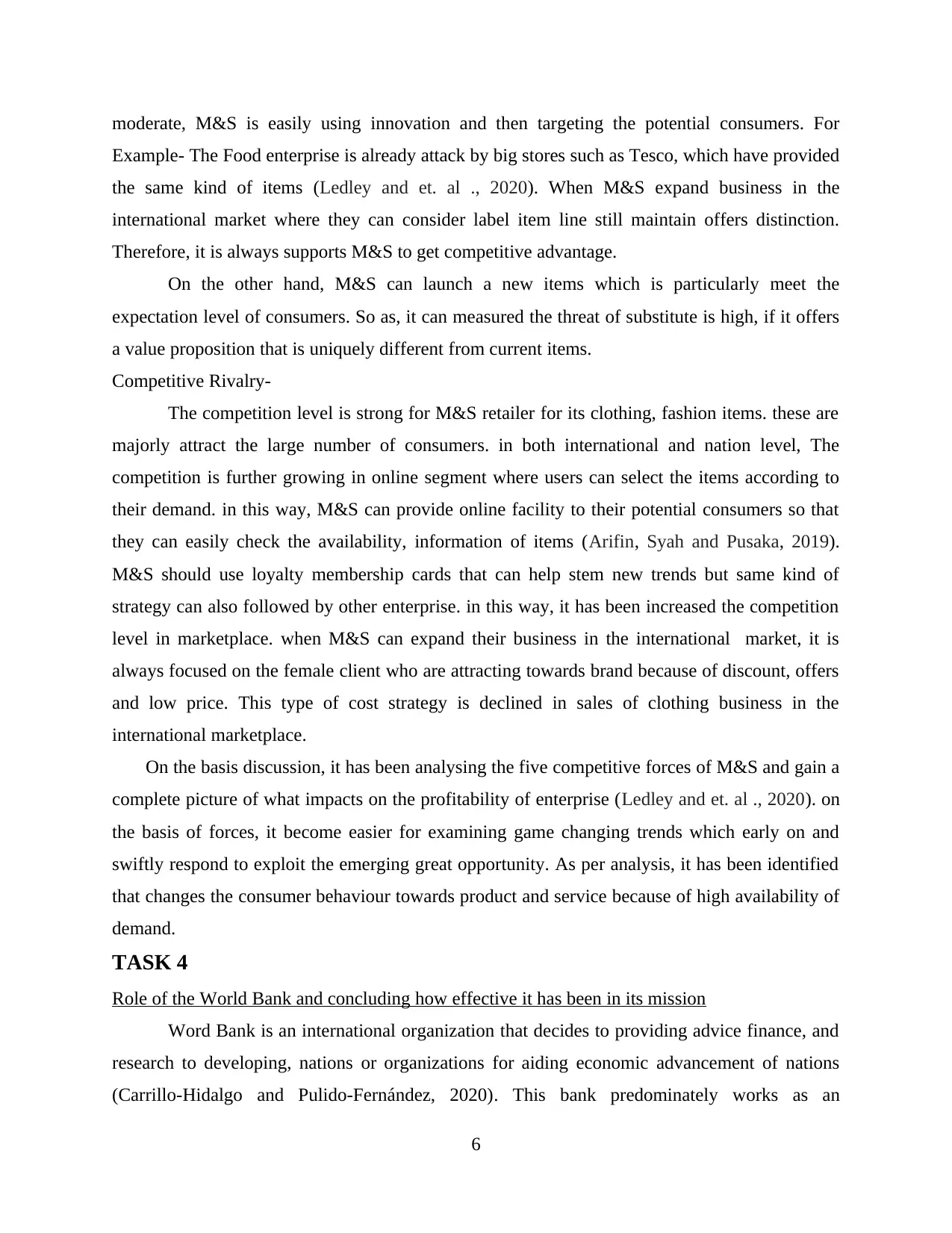
moderate, M&S is easily using innovation and then targeting the potential consumers. For
Example- The Food enterprise is already attack by big stores such as Tesco, which have provided
the same kind of items (Ledley and et. al ., 2020). When M&S expand business in the
international market where they can consider label item line still maintain offers distinction.
Therefore, it is always supports M&S to get competitive advantage.
On the other hand, M&S can launch a new items which is particularly meet the
expectation level of consumers. So as, it can measured the threat of substitute is high, if it offers
a value proposition that is uniquely different from current items.
Competitive Rivalry-
The competition level is strong for M&S retailer for its clothing, fashion items. these are
majorly attract the large number of consumers. in both international and nation level, The
competition is further growing in online segment where users can select the items according to
their demand. in this way, M&S can provide online facility to their potential consumers so that
they can easily check the availability, information of items (Arifin, Syah and Pusaka, 2019).
M&S should use loyalty membership cards that can help stem new trends but same kind of
strategy can also followed by other enterprise. in this way, it has been increased the competition
level in marketplace. when M&S can expand their business in the international market, it is
always focused on the female client who are attracting towards brand because of discount, offers
and low price. This type of cost strategy is declined in sales of clothing business in the
international marketplace.
On the basis discussion, it has been analysing the five competitive forces of M&S and gain a
complete picture of what impacts on the profitability of enterprise (Ledley and et. al ., 2020). on
the basis of forces, it become easier for examining game changing trends which early on and
swiftly respond to exploit the emerging great opportunity. As per analysis, it has been identified
that changes the consumer behaviour towards product and service because of high availability of
demand.
TASK 4
Role of the World Bank and concluding how effective it has been in its mission
Word Bank is an international organization that decides to providing advice finance, and
research to developing, nations or organizations for aiding economic advancement of nations
(Carrillo-Hidalgo and Pulido-Fernández, 2020). This bank predominately works as an
6
Example- The Food enterprise is already attack by big stores such as Tesco, which have provided
the same kind of items (Ledley and et. al ., 2020). When M&S expand business in the
international market where they can consider label item line still maintain offers distinction.
Therefore, it is always supports M&S to get competitive advantage.
On the other hand, M&S can launch a new items which is particularly meet the
expectation level of consumers. So as, it can measured the threat of substitute is high, if it offers
a value proposition that is uniquely different from current items.
Competitive Rivalry-
The competition level is strong for M&S retailer for its clothing, fashion items. these are
majorly attract the large number of consumers. in both international and nation level, The
competition is further growing in online segment where users can select the items according to
their demand. in this way, M&S can provide online facility to their potential consumers so that
they can easily check the availability, information of items (Arifin, Syah and Pusaka, 2019).
M&S should use loyalty membership cards that can help stem new trends but same kind of
strategy can also followed by other enterprise. in this way, it has been increased the competition
level in marketplace. when M&S can expand their business in the international market, it is
always focused on the female client who are attracting towards brand because of discount, offers
and low price. This type of cost strategy is declined in sales of clothing business in the
international marketplace.
On the basis discussion, it has been analysing the five competitive forces of M&S and gain a
complete picture of what impacts on the profitability of enterprise (Ledley and et. al ., 2020). on
the basis of forces, it become easier for examining game changing trends which early on and
swiftly respond to exploit the emerging great opportunity. As per analysis, it has been identified
that changes the consumer behaviour towards product and service because of high availability of
demand.
TASK 4
Role of the World Bank and concluding how effective it has been in its mission
Word Bank is an international organization that decides to providing advice finance, and
research to developing, nations or organizations for aiding economic advancement of nations
(Carrillo-Hidalgo and Pulido-Fernández, 2020). This bank predominately works as an
6
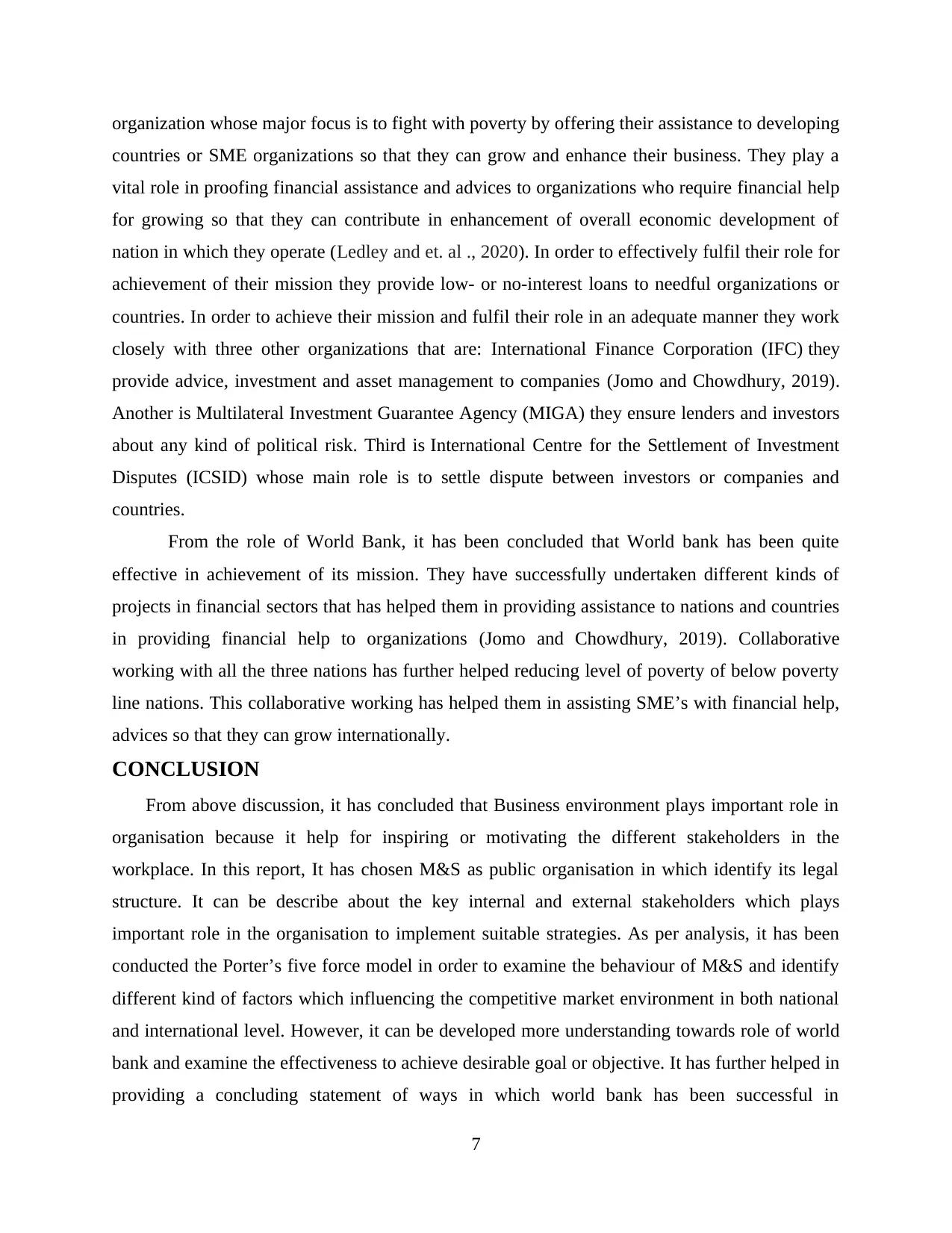
organization whose major focus is to fight with poverty by offering their assistance to developing
countries or SME organizations so that they can grow and enhance their business. They play a
vital role in proofing financial assistance and advices to organizations who require financial help
for growing so that they can contribute in enhancement of overall economic development of
nation in which they operate (Ledley and et. al ., 2020). In order to effectively fulfil their role for
achievement of their mission they provide low- or no-interest loans to needful organizations or
countries. In order to achieve their mission and fulfil their role in an adequate manner they work
closely with three other organizations that are: International Finance Corporation (IFC) they
provide advice, investment and asset management to companies (Jomo and Chowdhury, 2019).
Another is Multilateral Investment Guarantee Agency (MIGA) they ensure lenders and investors
about any kind of political risk. Third is International Centre for the Settlement of Investment
Disputes (ICSID) whose main role is to settle dispute between investors or companies and
countries.
From the role of World Bank, it has been concluded that World bank has been quite
effective in achievement of its mission. They have successfully undertaken different kinds of
projects in financial sectors that has helped them in providing assistance to nations and countries
in providing financial help to organizations (Jomo and Chowdhury, 2019). Collaborative
working with all the three nations has further helped reducing level of poverty of below poverty
line nations. This collaborative working has helped them in assisting SME’s with financial help,
advices so that they can grow internationally.
CONCLUSION
From above discussion, it has concluded that Business environment plays important role in
organisation because it help for inspiring or motivating the different stakeholders in the
workplace. In this report, It has chosen M&S as public organisation in which identify its legal
structure. It can be describe about the key internal and external stakeholders which plays
important role in the organisation to implement suitable strategies. As per analysis, it has been
conducted the Porter’s five force model in order to examine the behaviour of M&S and identify
different kind of factors which influencing the competitive market environment in both national
and international level. However, it can be developed more understanding towards role of world
bank and examine the effectiveness to achieve desirable goal or objective. It has further helped in
providing a concluding statement of ways in which world bank has been successful in
7
countries or SME organizations so that they can grow and enhance their business. They play a
vital role in proofing financial assistance and advices to organizations who require financial help
for growing so that they can contribute in enhancement of overall economic development of
nation in which they operate (Ledley and et. al ., 2020). In order to effectively fulfil their role for
achievement of their mission they provide low- or no-interest loans to needful organizations or
countries. In order to achieve their mission and fulfil their role in an adequate manner they work
closely with three other organizations that are: International Finance Corporation (IFC) they
provide advice, investment and asset management to companies (Jomo and Chowdhury, 2019).
Another is Multilateral Investment Guarantee Agency (MIGA) they ensure lenders and investors
about any kind of political risk. Third is International Centre for the Settlement of Investment
Disputes (ICSID) whose main role is to settle dispute between investors or companies and
countries.
From the role of World Bank, it has been concluded that World bank has been quite
effective in achievement of its mission. They have successfully undertaken different kinds of
projects in financial sectors that has helped them in providing assistance to nations and countries
in providing financial help to organizations (Jomo and Chowdhury, 2019). Collaborative
working with all the three nations has further helped reducing level of poverty of below poverty
line nations. This collaborative working has helped them in assisting SME’s with financial help,
advices so that they can grow internationally.
CONCLUSION
From above discussion, it has concluded that Business environment plays important role in
organisation because it help for inspiring or motivating the different stakeholders in the
workplace. In this report, It has chosen M&S as public organisation in which identify its legal
structure. It can be describe about the key internal and external stakeholders which plays
important role in the organisation to implement suitable strategies. As per analysis, it has been
conducted the Porter’s five force model in order to examine the behaviour of M&S and identify
different kind of factors which influencing the competitive market environment in both national
and international level. However, it can be developed more understanding towards role of world
bank and examine the effectiveness to achieve desirable goal or objective. It has further helped in
providing a concluding statement of ways in which world bank has been successful in
7
⊘ This is a preview!⊘
Do you want full access?
Subscribe today to unlock all pages.

Trusted by 1+ million students worldwide
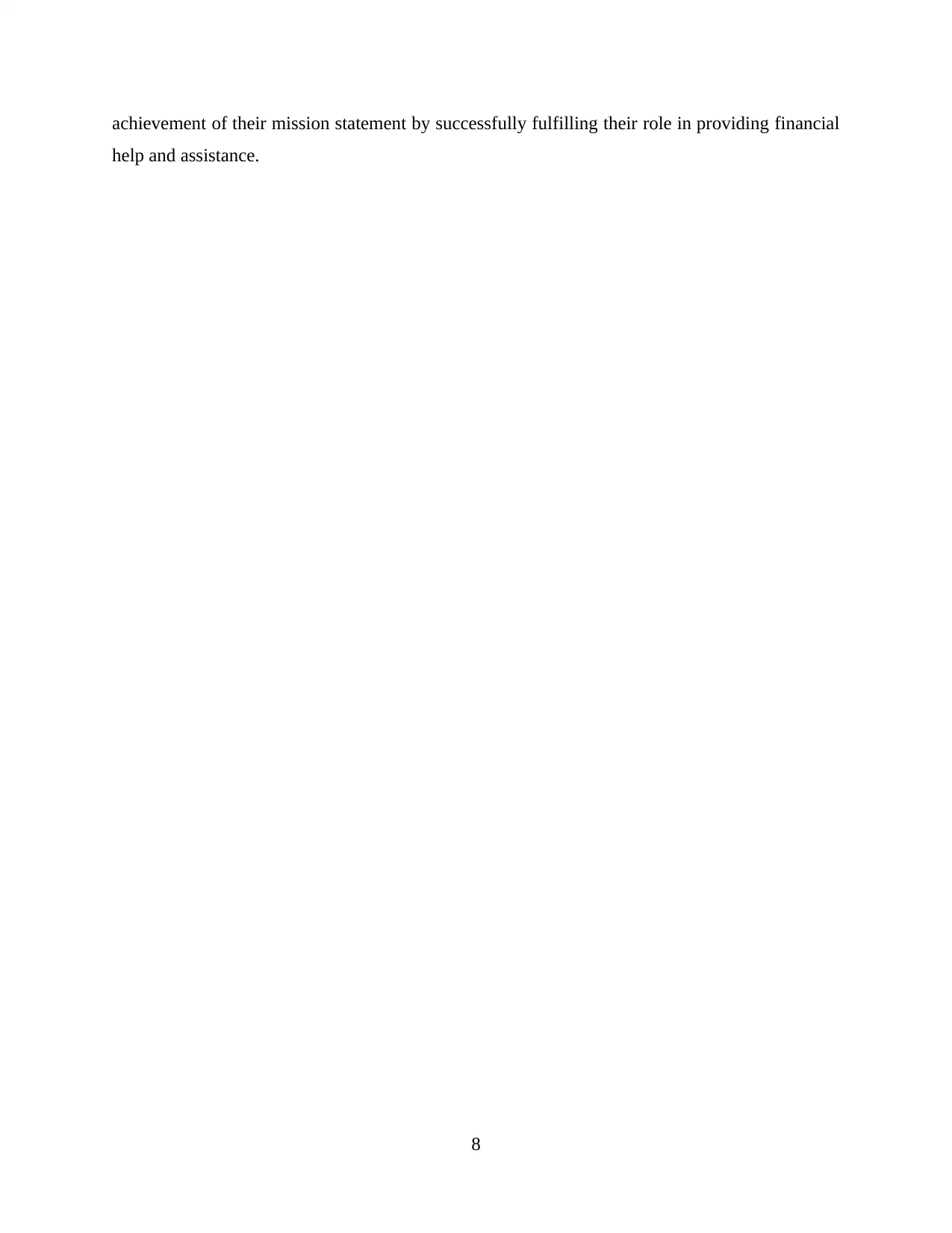
achievement of their mission statement by successfully fulfilling their role in providing financial
help and assistance.
8
help and assistance.
8
Paraphrase This Document
Need a fresh take? Get an instant paraphrase of this document with our AI Paraphraser
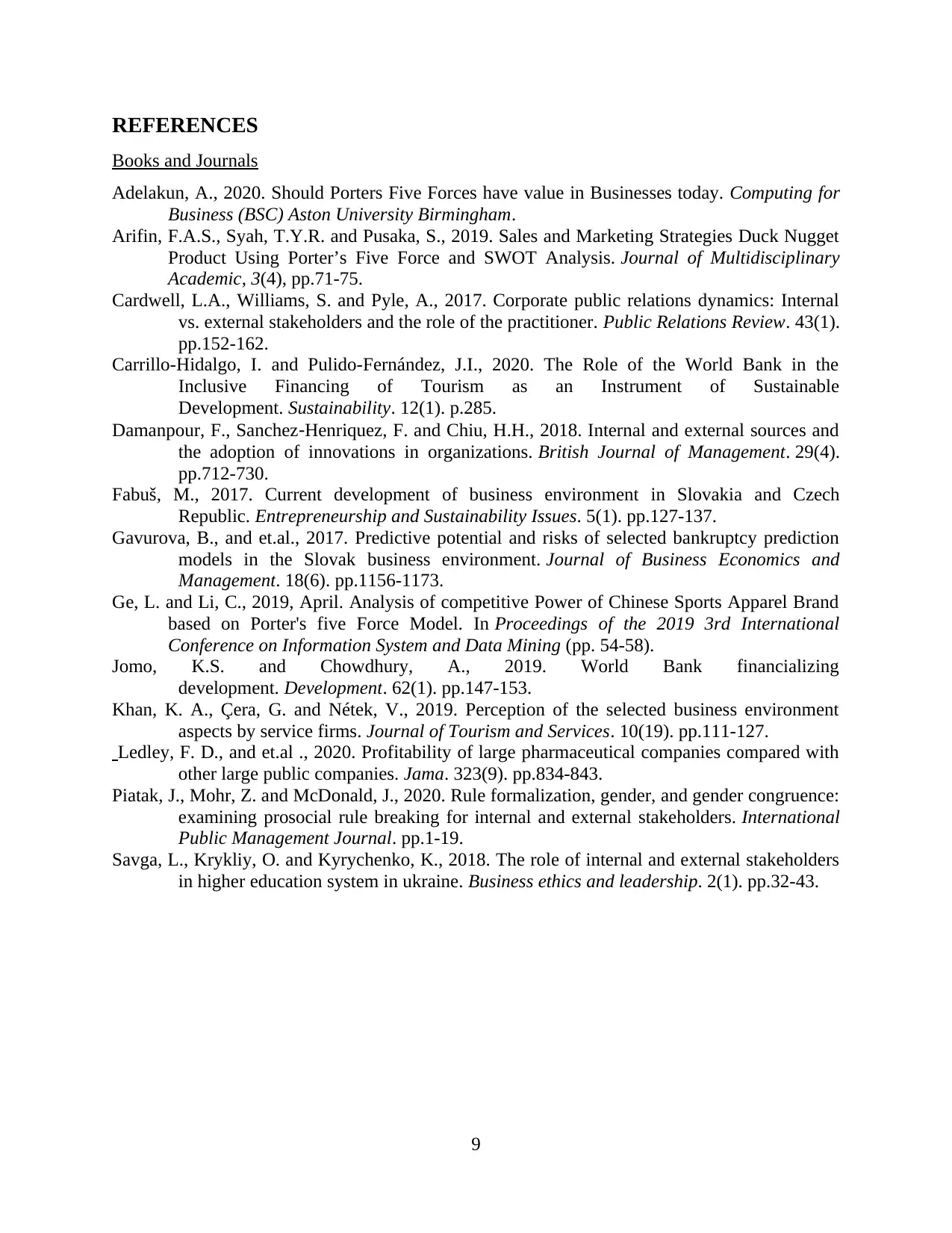
REFERENCES
Books and Journals
Adelakun, A., 2020. Should Porters Five Forces have value in Businesses today. Computing for
Business (BSC) Aston University Birmingham.
Arifin, F.A.S., Syah, T.Y.R. and Pusaka, S., 2019. Sales and Marketing Strategies Duck Nugget
Product Using Porter’s Five Force and SWOT Analysis. Journal of Multidisciplinary
Academic, 3(4), pp.71-75.
Cardwell, L.A., Williams, S. and Pyle, A., 2017. Corporate public relations dynamics: Internal
vs. external stakeholders and the role of the practitioner. Public Relations Review. 43(1).
pp.152-162.
Carrillo-Hidalgo, I. and Pulido-Fernández, J.I., 2020. The Role of the World Bank in the
Inclusive Financing of Tourism as an Instrument of Sustainable
Development. Sustainability. 12(1). p.285.
Damanpour, F., Sanchez‐Henriquez, F. and Chiu, H.H., 2018. Internal and external sources and
the adoption of innovations in organizations. British Journal of Management. 29(4).
pp.712-730.
Fabuš, M., 2017. Current development of business environment in Slovakia and Czech
Republic. Entrepreneurship and Sustainability Issues. 5(1). pp.127-137.
Gavurova, B., and et.al., 2017. Predictive potential and risks of selected bankruptcy prediction
models in the Slovak business environment. Journal of Business Economics and
Management. 18(6). pp.1156-1173.
Ge, L. and Li, C., 2019, April. Analysis of competitive Power of Chinese Sports Apparel Brand
based on Porter's five Force Model. In Proceedings of the 2019 3rd International
Conference on Information System and Data Mining (pp. 54-58).
Jomo, K.S. and Chowdhury, A., 2019. World Bank financializing
development. Development. 62(1). pp.147-153.
Khan, K. A., Çera, G. and Nétek, V., 2019. Perception of the selected business environment
aspects by service firms. Journal of Tourism and Services. 10(19). pp.111-127.
Ledley, F. D., and et.al ., 2020. Profitability of large pharmaceutical companies compared with
other large public companies. Jama. 323(9). pp.834-843.
Piatak, J., Mohr, Z. and McDonald, J., 2020. Rule formalization, gender, and gender congruence:
examining prosocial rule breaking for internal and external stakeholders. International
Public Management Journal. pp.1-19.
Savga, L., Krykliy, O. and Kyrychenko, K., 2018. The role of internal and external stakeholders
in higher education system in ukraine. Business ethics and leadership. 2(1). pp.32-43.
9
Books and Journals
Adelakun, A., 2020. Should Porters Five Forces have value in Businesses today. Computing for
Business (BSC) Aston University Birmingham.
Arifin, F.A.S., Syah, T.Y.R. and Pusaka, S., 2019. Sales and Marketing Strategies Duck Nugget
Product Using Porter’s Five Force and SWOT Analysis. Journal of Multidisciplinary
Academic, 3(4), pp.71-75.
Cardwell, L.A., Williams, S. and Pyle, A., 2017. Corporate public relations dynamics: Internal
vs. external stakeholders and the role of the practitioner. Public Relations Review. 43(1).
pp.152-162.
Carrillo-Hidalgo, I. and Pulido-Fernández, J.I., 2020. The Role of the World Bank in the
Inclusive Financing of Tourism as an Instrument of Sustainable
Development. Sustainability. 12(1). p.285.
Damanpour, F., Sanchez‐Henriquez, F. and Chiu, H.H., 2018. Internal and external sources and
the adoption of innovations in organizations. British Journal of Management. 29(4).
pp.712-730.
Fabuš, M., 2017. Current development of business environment in Slovakia and Czech
Republic. Entrepreneurship and Sustainability Issues. 5(1). pp.127-137.
Gavurova, B., and et.al., 2017. Predictive potential and risks of selected bankruptcy prediction
models in the Slovak business environment. Journal of Business Economics and
Management. 18(6). pp.1156-1173.
Ge, L. and Li, C., 2019, April. Analysis of competitive Power of Chinese Sports Apparel Brand
based on Porter's five Force Model. In Proceedings of the 2019 3rd International
Conference on Information System and Data Mining (pp. 54-58).
Jomo, K.S. and Chowdhury, A., 2019. World Bank financializing
development. Development. 62(1). pp.147-153.
Khan, K. A., Çera, G. and Nétek, V., 2019. Perception of the selected business environment
aspects by service firms. Journal of Tourism and Services. 10(19). pp.111-127.
Ledley, F. D., and et.al ., 2020. Profitability of large pharmaceutical companies compared with
other large public companies. Jama. 323(9). pp.834-843.
Piatak, J., Mohr, Z. and McDonald, J., 2020. Rule formalization, gender, and gender congruence:
examining prosocial rule breaking for internal and external stakeholders. International
Public Management Journal. pp.1-19.
Savga, L., Krykliy, O. and Kyrychenko, K., 2018. The role of internal and external stakeholders
in higher education system in ukraine. Business ethics and leadership. 2(1). pp.32-43.
9
1 out of 11
Related Documents
Your All-in-One AI-Powered Toolkit for Academic Success.
+13062052269
info@desklib.com
Available 24*7 on WhatsApp / Email
![[object Object]](/_next/static/media/star-bottom.7253800d.svg)
Unlock your academic potential
Copyright © 2020–2026 A2Z Services. All Rights Reserved. Developed and managed by ZUCOL.





